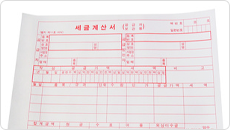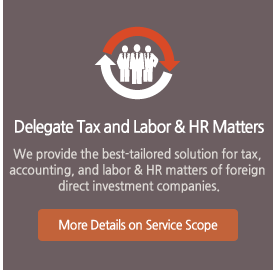Tax and Accounting
Corporate Tax
Corporate tax is a tax levied on the relevant company’s annual revenue.
-
Corporate tax filing
Corporate tax needs to be filed within 3 months from the end of business year.
Financial statements, etc. based on the corporate accounting standard need to be attached. Most filings are conducted electronically. -
Corporate tax payment
Corporate tax should be paid either electronically or through a bank at the same time with tax filing.
Value-added Tax
Issuance and transmission of value-added tax (“VAT”) invoices are required by the 10th day of the month immediately following the month in which the transaction concerned was completed.
Failures to transmit by the 10th day of the month immediately following the month in which the VAT invoices should have been transmitted would result in the additional tax of 0.5%.
Failures to transmit by the 10th day of the month immediately following the month in which the VAT invoices should have been transmitted would result in the additional tax of 0.5%.
-
Method of calculation of VAT
VAT is calculated by subtracting the value-added in the purchase price from the value-added in the sale price.
VAT is levied for each stage / step of value-added. -
VAT filing and payment
should be made every 3 months – January, April, July, and October of every year.
Withholding Tax
Withholding tax is an employee’s income tax withheld by his/her company (a person responsible for withholding) at the time of payment his/her wages to the employee (a person with tax payment obligation) and paid to the tax authority.
-
Publication of withholding details in payslips
Withheld tax amount needs to be notified and paid to the local tax office with jurisdiction by the 10th day of the immediately following month. The monthly tax amount to be withheld is determined pursuant to the National Tax Service’s withholding income tax table. In every February, the year-end tax adjustment is made based on supporting materials about the withheld amount of the earned-income tax in the previous year. At the time of year-end tax adjustment, the National Tax Service reviews the deduction documents submitted; if it takes a view that additional deduction was made, it would impose additional taxes. -
Special provisions about foreign employees
The uniform tax rate of 17 percent is available to foreign officers and employees by the end of 2016. With respect to retirement pension, interest, dividend, and other forms of revenues, they should be withheld in accordance with the withholding tax rates applicable to each of the foregoing. For the tax amount withheld from the company, such amount is deducted as prepaid tax at the time of corporate tax filing.
-
Corporate Tax Management
 The National Tax Service of Korea (the “NTS”) has the systematically computerized material analytical system. As such, book manipulations are easily detected by the NTS’s computer network in which case the evaded tax would be imposed at once even if such evasion lacked any intent or fault.
The National Tax Service of Korea (the “NTS”) has the systematically computerized material analytical system. As such, book manipulations are easily detected by the NTS’s computer network in which case the evaded tax would be imposed at once even if such evasion lacked any intent or fault.
Moreover, as tax evasion is accompanied by business issues and criminal sanctions, lawful means of tax saving is advisable. -
Additional tax for tax filingTax filing in Korea is the filing-based system. Thus, additional taxes are imposed for erroneous tax filings.Imposition of additional tax
Additional taxes are imposed for failures to file and understated filings. In particular, 40 percent of additional tax as well as related individual income tax are imposed for unjustifiable filings.For omission of revenues and excessive expenses would result in the collection of corporate tax; the omitted amount would be deemed as bonus or dividend paid to the attributable person. -
Selection of subject matters of tax audit
 Filings and attachments thereto are recorded in the NTS’s computer system and the NTS will verify whether the filings are in order.
Filings and attachments thereto are recorded in the NTS’s computer system and the NTS will verify whether the filings are in order.
Where dishonest filings are suspected, the NTS may engage in tax audits. -
Need to keep the supporting documents for expenses
 “need to keep the documents that prove the expenses spent at the time of transactions. The legitimate supporting documents include tax invoice and card / cash receipts. For general receipts in excess of KRW 30,000, additional taxes would be imposed.
“need to keep the documents that prove the expenses spent at the time of transactions. The legitimate supporting documents include tax invoice and card / cash receipts. For general receipts in excess of KRW 30,000, additional taxes would be imposed.
In particular, the supporting documents to prove so-called entertainment expenses must be legitimate documents in the form of card / cash receipts.
Expenses from the use of corporate cards can still be denied as valid proof if the card was used at a store different from where it was actually used. -
Handling tax invoices
 Failures to receive tax invoices at the time of purchase in construction sites, etc. will result in the imposition of additional taxes.
Failures to receive tax invoices at the time of purchase in construction sites, etc. will result in the imposition of additional taxes.
Forged tax invoice transactions would be detected by the NTS’s computer system.
In such case, the businesses involved would be targeted for the NTS’s focused tax audit – along with the tax collection, a substantial amount of additional taxes would be imposed. Businesses involved with false tax invoices would be sanctioned under the Punishment of Tax Evaders Act. -
Amended Filing and Reassessment Claim
 “Taxpayer may file amended filings for understated filings prior to the tax authority’s taxation decision. Amended filings within 6 months, 1 year, and 2 years will each save 50 percent, 20 percent, and 10 percent of additional taxes.”
“Taxpayer may file amended filings for understated filings prior to the tax authority’s taxation decision. Amended filings within 6 months, 1 year, and 2 years will each save 50 percent, 20 percent, and 10 percent of additional taxes.”
For the filing or imposition of excessive taxes, one may submit an amended filing within 5 years and thereby retrieve the relevant amount. -
Transfer pricing taxationThis is a system by which the NTS and companies concerned pre-determine the appropriate level of transfer price between persons in special relationship. The purpose of this system is to prevent the tax avoidance arising from the differences in tax rates between different countries.
Taxpayers may use the APA pre-approved by the NTS during the APA period assuming it meets the major assumptions concerned.APA process
Prior meeting – evaluation – mutual agreement – determination of APA – submission of annual report
Relationship between APA and tax audit
“APA request will not delay tax audit; however, if there is request for APA prior to tax audit, it may be postponed until the determination of APA.” In this case, the company concerned still needs to submit the necessary documents for the determination of APA; otherwise, its request for APA would be cancelled. -
Benefits for small and medium sized enterprises (“SMEs”)
 - The maximum limit on entertainment expenses is KRW 24 million per annum.
- The maximum limit on entertainment expenses is KRW 24 million per annum.
- In case of merger between SMEs, the deduction of carried over deficit is applicable.
- Retroactive deduction (carryback) of deficit
- Withholding tax may be paid semi-annually for business places with 20 persons or less.
- Extension of corporate tax installment payment period -
Tax auditTax audit period usually complies with the general audit period; however, it can differ depending on various factors such as the scope of audit and form of corporate entity.







